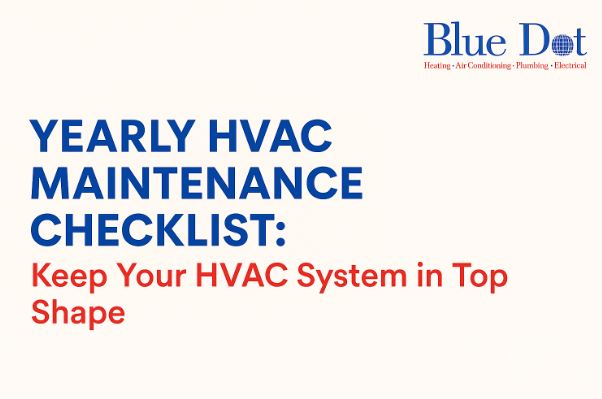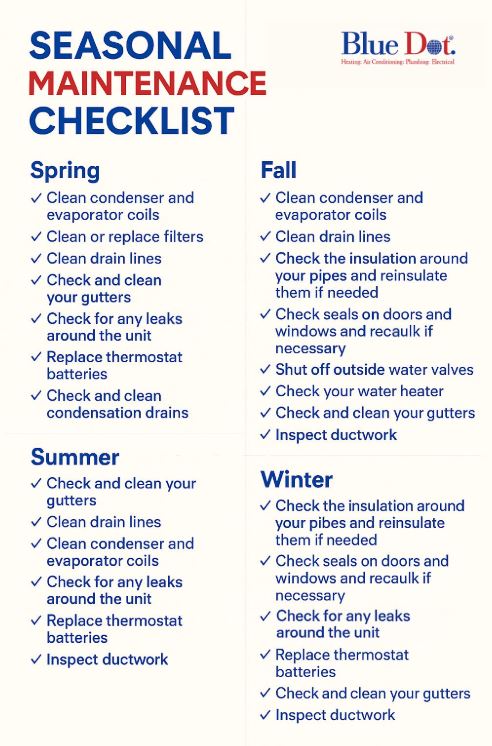HVAC Maintenance Checklist: What’s Safe to DIY and When to Call a Professional
-

Yearly HVAC Maintenance Checklist: Keep Your HVAC System in Top Shape
It doesn't matter if you're a new homeowner or a seasoned vet—you always want to keep your home safe and comfortable. However, to do that, you need to put a little effort into upkeep. While most people are great about keeping their home clean and changing lightbulbs, they often forget about their HVAC system.
Without proper maintenance, your HVAC system can suffer from efficiency issues and even stop working altogether. You could have a broken AC in the middle of summer or a noisy heater in the winter. Thankfully, maintenance isn't that hard to do, especially with a trustworthy HVAC service like Blue Dot Services at your side.
Use our HVAC maintenance checklist to learn what's safe to do on your own and when it's time to call us. We've been serving Maryland and the surrounding area for years.
- Yearly HVAC Maintenance Checklist: Keep Your HVAC System in Top Shape
- What Is HVAC Maintenance and Why Is It Important?
- What's Included in HVAC Maintenance Services?
- How Often Should You Schedule HVAC Maintenance?
- Yearly HVAC Maintenance Checklist
- DIY vs. Professional HVAC Service
- What Happens If You Avoid HVAC Maintenance?
- A Well-Maintained HVAC Is a Happy HVAC
What Is HVAC Maintenance and Why Is It Important?
HVAC maintenance refers to taking care of your HVAC system by cleaning, replacing parts, and setting up service checkups with professionals. HVAC maintenance is crucial to homeowners and building owners for many reasons:
-
Tenant satisfaction: For landlords, HVAC maintenance ensures that their tenants are comfortable at all times. No one likes to deal with a broken AC or heater. If it takes too long to fix, you can lose Yearly HVAC Maintenance Checklist: Keep Your HVAC System in Top Shapeyour tenants' trust, leading them to move out.
-
Safety: A well-maintained system won't leak carbon monoxide or pose electrical hazards—so your home stays comfortable and secure all year long.
-
Clean air: Your HVAC system plays a key role in circulating and filtering the air in your home. Without regular maintenance—like changing filters or cleaning ducts—dust, allergens, and pollutants can build up in the system, impacting indoor air quality and potentially triggering allergies or illness.
-
Cost savings: Maintenance can prevent repairs or replacements by stopping small problems from becoming bigger ones. It can also help you save money on your utility bills since a well-maintained system is more efficient.
-
Extended lifespan: Identifying problems early and offering a little TLC can make your system work better for longer. A poorly maintained HVAC system has to work harder for the same result, which strains the various internal components. Strained parts break more easily, leading to repairs or an entire system replacement.
-
Warranty preservation: Most HVAC warranties require maintenance checks. If you don't have one, the warranty will be void.
What's Included in HVAC Maintenance Services?
When a Blue Dot Services technician comes to your home, they bring a polite attitude and respect for your home as they:
-
Inspect the entire system.
-
Change air filters if needed.
-
Check refrigerant levels.
-
Clean internal components (evaporator and condenser coils).
-
Inspect the condenser fan motor.
-
Inspect the compressor, capacitors, and blower motor.
-
Check the entire electrical system.
-
Inspect the ductwork for leaks or corrosion.
-
Check for carbon monoxide leaks.
-
Tighten gas connectors.
-
Clean heater burners.
-
Check the flame sensor.
-
Inspect the thermostat settings.
-
Lubricate internal parts.
-
Check and clean the condensate drain.
-
Identify potential issues with the system.
-
Replace parts if needed.
How Often Should You Schedule HVAC Maintenance?
You should schedule two HVAC maintenance appointments each year. Schedule yours in the spring and fall, so you can be sure that your family is comfortable in summer and winter when your system works the hardest.
If you sign up for our Pro Plan, you get two free maintenance checks each year!
Yearly HVAC Maintenance Checklist (Broken Down By Season)
To make things easier, we've made an easy HVAC inspection checklist for homeowners. Don't forget: The best thing you can do for your system is to schedule regular HVAC maintenance.

Spring
-
Clean condenser and evaporator coils.
-
Clean or replace filters.
-
Clean drain lines.
-
Check and clean your gutters.
-
Check for any leaks around the unit.
-
Replace thermostat batteries.
-
Check and clean condensation drains.
-
Inspect ductwork.
Summer
-
Check and clean your gutters.
-
Clean drain lines.
-
Clean condenser and evaporator coils.
-
Check for any leaks around the unit.
-
Replace thermostat batteries.
-
Check and clean condensation drains.
-
Inspect ductwork.
Fall
-
Clean condenser and evaporator coils.
-
Clean drain lines.
-
Check the insulation around your pipes and reinsulate them if needed.
-
Check seals on doors and windows and recaulk if necessary.
-
Shut off outside water valves.
-
Check your water heater.
-
Check and clean your gutters.
-
Check for any leaks around the unit.
-
Replace thermostat batteries.
-
Check and clean condensation drains.
-
Inspect ductwork.
-
Inspect the heater's burner.
-
Check heating elements.
Winter
-
Check the insulation around your pipes and reinsulate them if needed.
-
Check seals on doors and windows and recaulk if necessary.
-
Check for any leaks around the unit.
-
Replace thermostat batteries.
-
Check and clean condensation drains.
-
Inspect ductwork.
-
Break ice away from the gutters and the outdoor unit.
DIY vs. Professional HVAC Service
It's important for homeowners to understand which maintenance tasks can be done on their own and which require a professional. Here's a handy chart to help you.
| DIY | Professional |
|---|---|
| Changing air filters | Replacing parts |
| Cleaning your outdoor unit | Anything with refrigerant |
| Cleaning the condensate drain | Lubricating pipes |
| Replacing thermostat batteries | Cleaning internal parts |
| Insulating your pipes | Repairing parts |
| Leak inspections | Anything with the electric system |
Changing Air Filters
Changing your HVAC's air filters is easy. Check your owner's manual to find what type of filter you need to buy. Depending on your system, the filter may be located in the main HVAC unit or behind a return air grille—often found on a wall or ceiling.
Once you've located it, open the panel, remove the old filter, and slide in the new one, making sure the arrows on the frame point in the direction of airflow. Replace the cover securely.
Cleaning Your Outdoor Unit
When cleaning your outdoor unit, remove any obvious debris, like sticks and leaves, from the unit. Once that's done, you can use a low-pressure water hose to clean the vents and fins.
Clean Condensate Drain
Locate your system's PVC condensate drain line—usually near the indoor unit. You can check your owner's manual if you're unsure. Remove any visible debris, such as dirt or algae buildup, and then flush the line with a mixture of water and vinegar or warm water to help prevent clogs and mold growth. Make sure it's draining properly before closing everything back up.
Replacing Thermostat Batteries
Open your thermostat panel, remove the old batteries, and add new ones. You may have to reset the system, depending on the type of thermostat you have.
While you're focused on your thermostat, this might be a good time to ask whether you have the best unit for your home. Smart thermostats learn your living patterns and can adjust temperatures accordingly to when you're home, away, or sleeping. Consider upgrading to a smart thermostat to see how much money you can save.
Insulate Your Pipes
Measure your pipes to determine how much insulation you need to buy. Cut and wrap the insulation around the pipes, securing it with tape or wire.
Leak Inspections
For liquid leaks, you can look around your units to see if puddles are forming or listen for dripping.
For air leaks, walk around your ductwork with your hand running along the vent. If you feel air or hear whistling, you may have an air leak and need to call Blue Dot.
What Happens If You Avoid HVAC Maintenance?
Lack of maintenance can lead to:
-
Higher energy bills
-
Increased chance of needing repairs or replacements
-
Shorter lifespan
-
Potential safety concerns
-
Low air quality
-
Increased chance of a breakdown
A Well-Maintained HVAC Is a Happy HVAC
Taking an afternoon out of each season to cross off tasks from your HVAC checklist will save you a lot of money and stress. However, it's always important to be safe, so if your HVAC has any serious issues or you feel uncomfortable, call a professional. Our prompt service and financing options make us a trusted favorite for Maryland area residents.
Blue Dot Services is also here to help with furnace tune-ups, water heater repair issues, and emergency plumbing services.
